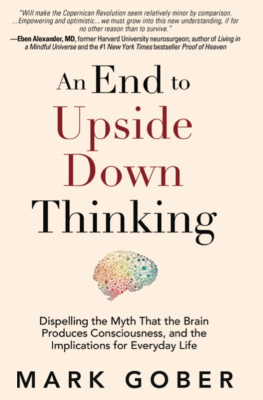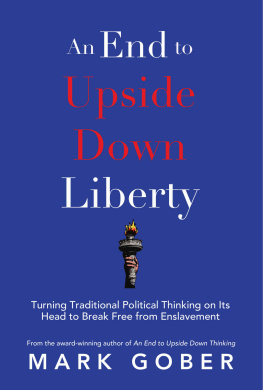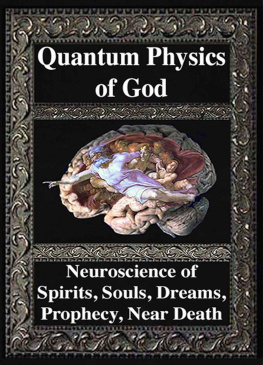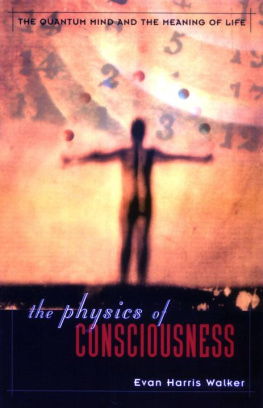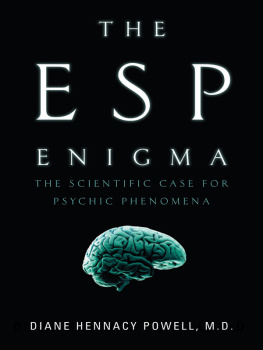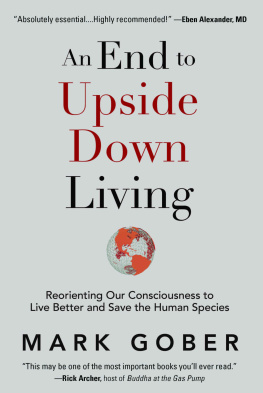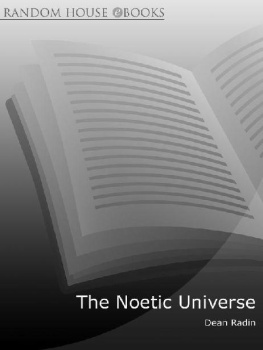An End to Upside
Down Thinking
Dispelling the Myth That
the Brain Produces
Consciousness, and the
Implications for
Everyday Life
Mark Gober
Copyright 2018 by Mark Gober
All rights reserved. This book or any portion thereof may not be reproduced or used in any manner whatsoever without the express written permission of the publisher, except for the use of brief quotations in a book review.
First Printing, 2018
ISBN-13: 978-1-947637-85-6 print edition
ISBN-13: 978-1-947637-86-3 ebook edition
ISBN-13: 978-1-947637-87-0 audio edition

Waterside Press
2055 Oxford Ave.
Cardiff-by-the-Sea, CA 92007
www.waterside.com
To the individuals who have bravely departed from orthodoxy
to explore the limits of science. Without their efforts,
this book would not have been possible.
All I did was collect and organize the pieces.
Everything we know is only some kind of approximation, Richard Feynman once said. Therefore, things must be learned only to be unlearned again or, more likely, to be corrected. This is where Galileo, Newton, Darwin, and Einstein did their work. All the revolutionaries have been challenged, accepted, then challenged again. As George Bernard Shaw put it, All great truths begin as blasphemies.
Where science does have a problem is in the fact that our collective memories are so short. Once that resigned acceptance of a discovery comes, we forget that there was once such a kerfuffle. We act as if truth were always with us, that it is self-evident. We forget the decades of persecution someone endured in order to shepherd us to the view we would now die to defend. And so we become comfortableso comfortable that we will wantonly persecute the man or woman who comes to disturb our newfound peaceful state.
Quantum physicist Michael Brooks,
author of Beyond the Safe Zones of Science
(EdgeScience, September 2015)
Contents
Preface
A framework to consider while reading this book
Before you begin reading, I warn you that you might need to suspend everything you thought you knew about reality. Remind yourself that while humanity has come a long way, there is still a lot that we do not know. For example, ~96 percent of the universe is mysterious dark matter and dark energy, about which we know very little. As billionaire hedge-fund manager Ray Dalio advises in his Principles: I believe you must be radically open-minded. I likewise encourage radical open-mindedness as we contemplate theories of our existence in this book.
Whether you realize it or not, most of modern societys thinking is based upon a philosophy known as materialismthe notion that physical material, known as matter, is fundamental in the universe. In other words, matter is the basis of all reality. Everything is comprised of matter, and everything can be reduced to matter.
The basic thinking is as follows: There was a Big Bang 13.8 billion years ago that started the universe. Units of matteratomsinteracted throughout the universe. The interactions of matter are commonly called chemistry. After countless, random chemical reactions, self-replicating molecules known as DNA eventually formed on Earth. DNA molecules served as the building blocks for the evolution of life. Human beings and other organisms evolved and developed brains. The brain enabled humans to have minds and awareness: an inner experience sometimes called consciousness.
In short, materialism assumes that matter (e.g., the brain) produces consciousness, as shown in Figures A and B on the following pages.

Figure A. Todays mainstream scientific view, known as materialism, is that consciousness is produced by the brain, which is a product of physical matter
This line of thinking informs views on our existence. Because materialism assumes that the brain produces consciousness, when your brain dies, your consciousness dies. If there is no brain, then there is no consciousness. Therefore, any meaning a person ascribed to his or her life while living is wiped out once the person dies.
That might sound bleak and nihilistic, but unfortunately it is what a literal interpretation of materialism implies. I know this because I used to be a materialist; and as someone who relied strictly on logical reasoning rather than faith, I had no choice but to accept these implications.
However, simple introspection revealed that materialism is a superstitious belief system that cannot be proven.
Heres why.
Think of any experience you have. I am happy. I am sad. I see the car. I feel a burning sensation. Constant in those experiencesin any experienceis I: the subject that is experiencing something. It is not possible to definitively verify an experience without an I (i.e., consciousness) to experience it.
Imagine a universe in which all conscious beings were absent. Could that universe exist? It is possible. Materialism would predict that the
Therefore, materialism, which assumes that matter comes before consciousness, is an unverifiable belief system. How can it be proven that anything exists or existed without some I to experience it? Without consciousness, we cannot prove that anything exists.
As philosopher Rupert Spira puts it: The materialist perspective is not grounded in experience. It requires an abstract line of reasoning that presupposes the existence of a reality outside consciousness, although nobody has ever experienced this, nor could they ever experience it. The materialist point of view asserts the reality of that which is never experiencedmatter [outside consciousness]and denies that which alone is always experiencedconsciousness itself. That is the tragedy and the absurdity of the materialist perspective from which humanity is suffering [emphasis in original].
Materialisms logic is twisted when you break it down. You might need to read this slowly.
Matters existence before consciousness, as described above, cannot be known for sure. We just showed that. Therefore, matters existence before consciousness is unknown. In other words, it is an abstraction.
Conversely, we know that we have conscious experienceyou are conscious as you read these words. So, consciousness is unquestionably known. In other words, it is concrete.

Figure B. Materialism purports that matters existence before consciousness (an unknown abstraction) creates consciousness (which is known and concrete)
Now, lets reexamine materialism with this lens. Materialism assumes that matter precedes and creates consciousness. We just established that matters existence before consciousness is unknown, whereas, with consciousness it is known. So materialism is saying, Lets use an unknown, abstract thing to infer the known, concrete thing.
Most areas of logical inquiry start with the knowns to explore unknowns. Materialism has it backward. It says the unknown causes the known, that the abstraction causes the concrete.
For these reasons, among others, philosopher Bernardo Kastrup, PhD, entitled his 2014 book Why Materialism Is Baloney. As he states it: Materialism is a reasonable castle built on top of rotten foundations.
Why is this important? Modern science, which is dominated by materialism, prides itself on evidence and proof. It often criticizes religions for relying on leaps of faith to justify beliefs. For example, materialist biologist Richard Dawkins ridicules faith. In his words: What is faith but belief without evidence? Faith isbelieving it because you want to believe it. That is not a respect-worthy reason to believe anything. Ironically, the basic tenet of materialismwhich is that matter (the brain) produces the consciousnessis based on its own leap of faith. There is no controlled, double-blind study that science can conduct to conclusively prove that matter preexisted consciousness.
Next page
